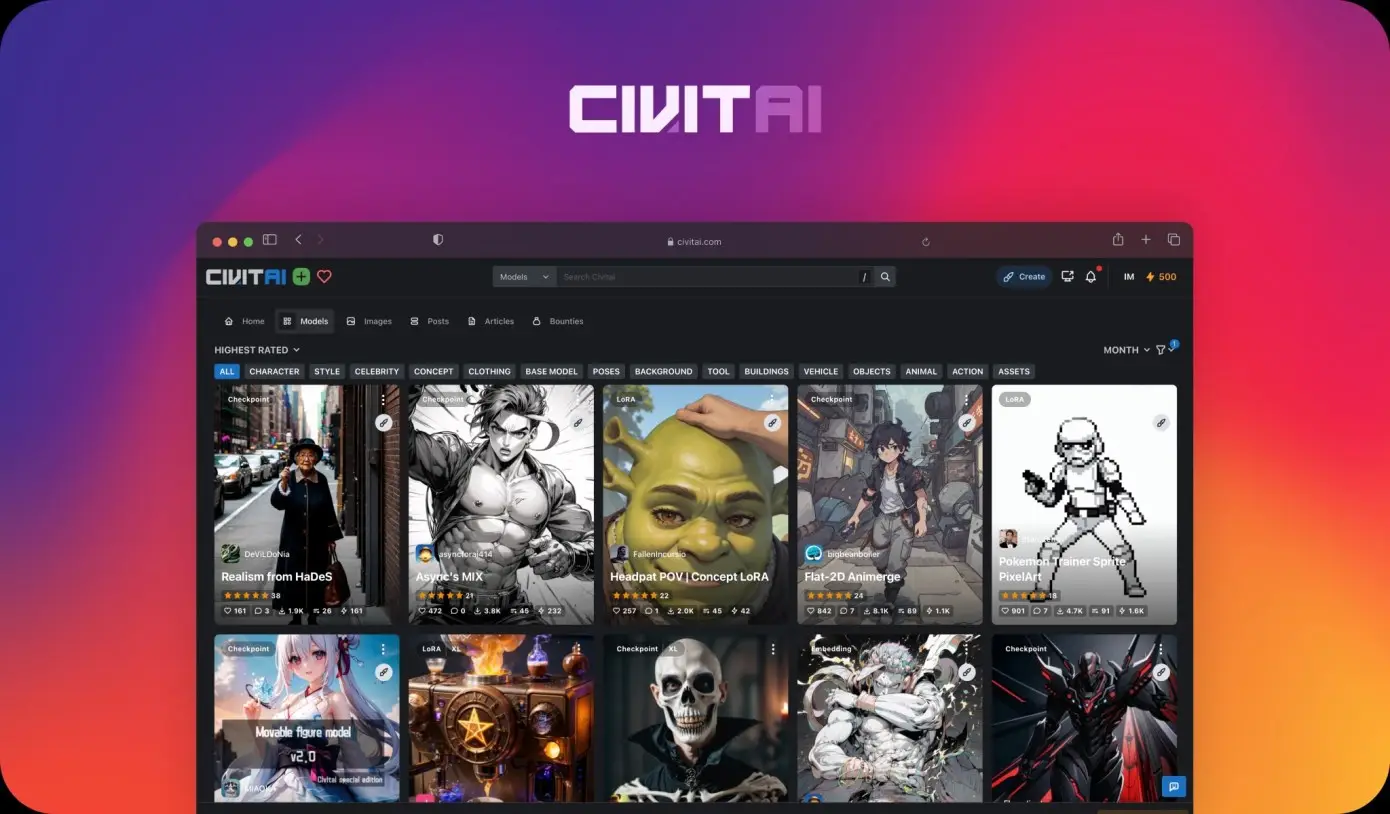
The AI image generator Stable Diffusion has rapidly gained a dedicated following, and enthusiasts looking to experiment and develop their own AI models now have a hub for collaboration and sharing. Civitai, aptly named to reflect the concept of ‘community’ (Civitas), is a startup that has established a platform where users can showcase their Stable Diffusion-based AI image models for discovery by others, as well as share the AI-generated images they’ve created.
Civitai’s CEO, Justin Maier, elaborates on the startup’s origins, citing a gap in the market for a dedicated space where people could both share and find AI models. Maier, who had previously worked on web development projects as a contractor at Microsoft, found his interest piqued by Midjourney, drawn by its blend of creativity and collaboration.
However, Maier encountered limitations with Midjourney’s credit-based system, leading to long waits for image generation. His love for the creative freedom it offered inspired him to look for alternatives. This search coincided with the release of Stable Diffusion, an open-source equivalent for AI image generation. As the community around Stable Diffusion expanded, users experimented with various techniques, such as custom prompts and personal images for AI-generated selfies, leading to the creation of unique models.
ntimicrobials are designed to target Gram-negative bacteria, including resistant varieties like Pseudomonas aeruginosa and Klebsiella pneumoniae.
Noticing these developments scattered across platforms like Reddit and Discord, Maier saw the need for a centralized space. This realization gave birth to Civitai (originally named Model Share), an online community designed to systematically organize and make this content easily accessible.
Initially, Maier personally invited model creators to share their work on Civitai. The site started with a modest collection of around 40 to 50 models but gradually expanded as more creators joined and shared their innovations.
Maier recounts the enthusiasm of users who appreciated the recognition for their creative efforts on Civitai. By January, Civitai had emerged as the primary platform for sharing AI models and images. “While other sites like HuggingFace existed, they weren’t focused on images. Thus, we naturally became the leading hub for sharing AI models, resources, and the images created,” Maier notes.
As of January 2023, Civitai reached a milestone of 100,000 registered users, leading Maier to realize its potential beyond just a community project – it could be a viable business. Following its formal establishment, the platform witnessed rapid growth, reaching one million registered users within three months. Presently, Civitai boasts about 3 million registered users and attracts approximately 12 to 13 million unique visitors monthly.
Reflecting on this growth, Maier expresses amazement: “It’s astounding how quickly it has expanded — far exceeding our initial expectations back in January.”
Out of Civitai’s 3 million users, only about 10,000 unique creators upload new models each month. This figure has increased by roughly 25% in the last month, following Civitai’s introduction of on-site model training, simplifying the process for beginners. While a smaller group is engaged in model creation, a larger audience actively consumes these models and the content they generate.
Civitai’s expansion, co-founded by Maxfield Hulker and Briant Diehl, led to a successful funding round in June. They raised $5.1 million, led by Andreessen Horowitz (a16z), at a $20 million valuation. Interestingly, the legal team that assisted in finalizing the round also participated in the funding.
Andreessen Horowitz Partner Brian Kim remarked, “Civitai exemplifies a company that has built an incredible, active community without any marketing expenditure. Our investment will enhance an already thriving platform, enabling more individuals to harness the potential of AI, the most significant technological shift of our era.”
Using Civitai involves uploading images that represent a certain style, selecting a base model, and waiting approximately an hour for the new model to be ready. This process allows users to generate their own images in the chosen style. Civitai encourages users to include metadata with images, detailing prompts and resources used, and recommends the same for models created off-site.
Civitai faces challenges, notably with artists discovering their work used in AI model training. To mitigate this, Civitai has implemented a system allowing artists to flag resources they believe misuse their work, leading to negotiations for resolution, which may involve removing the resource or just the artist’s name.
Maier hopes for a future where artists can directly use these styles and, if they choose, allow others to create in their style for a fee. However, he acknowledges that it’s still early days, and collaboration with interested artists is limited.
404Media highlights a more serious issue at Civitai: users posting non-consensual pornographic images and creating bounties for AI-generated images with specific targets, styles, or compositions, paid in virtual currency. While Civitai’s policies forbid non-consensual pornographic AI images and limit training AI on real people, there have been instances of users circumventing these policies to share prohibited content off-site. Civitai has responded by emphasizing its policy against mature and suggestive content, providing a removal request form, and noting that while real-person generation is possible with the foundational Stable Diffusion model, it’s not allowed on their platform. Bounties involving real people’s likenesses account for 10% of requests.
Navigating the complex terrain of AI, Maier envisions a future market for legitimate AI applications, including its integration in movies, music videos, apps, and other creative projects. For the immediate future, Civitai aims to develop a consumer-friendly mobile app that serves as a repository for AI imagery, complementing the activities on the main website.
Civitai is also shifting its focus towards enabling users to monetize their creations. This could involve partnerships with brands seeking unique AI-generated concepts or direct monetization strategies like charging for access to specific models or for individual image generation. Currently, all site features are free, with Civitai utilizing Cloudflare’s R2 to minimize download costs.
Maier discusses future plans: “I’m interested in collaborating with brands and individuals to allow them to sell their likenesses for uses like advertising. We’re looking at setting up licensing and permissions that carefully control how these likenesses can be used. This will be crucial as we navigate the evolving landscape of AI.”
While the startup is currently focused on AI image models, Maier anticipates expanding into other areas in the long run.



